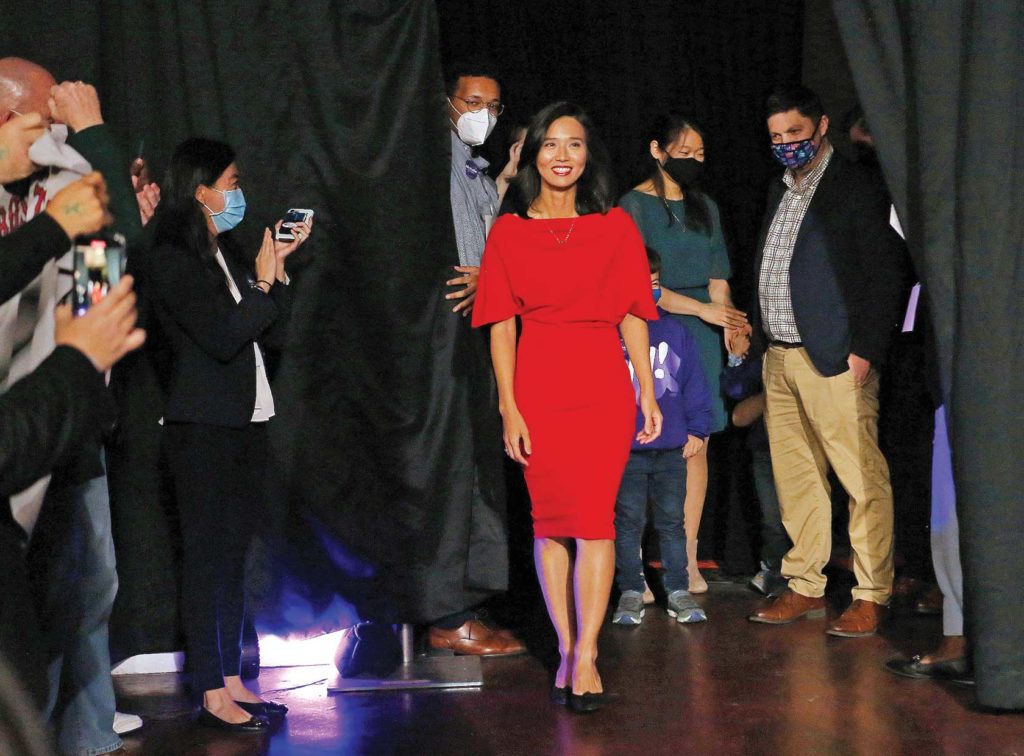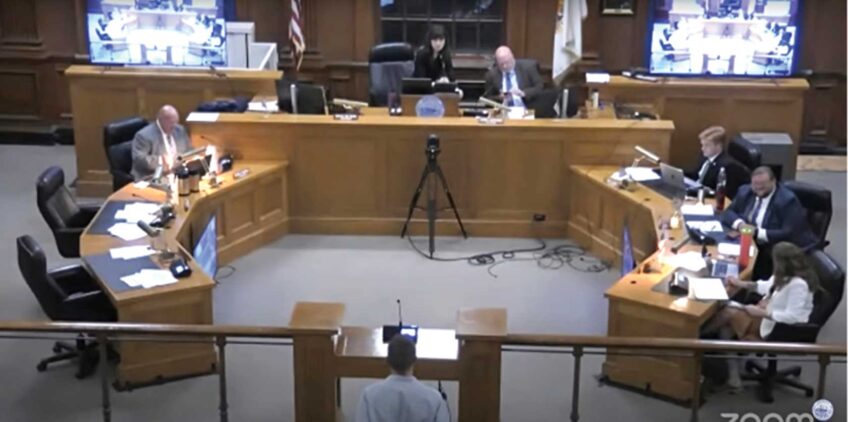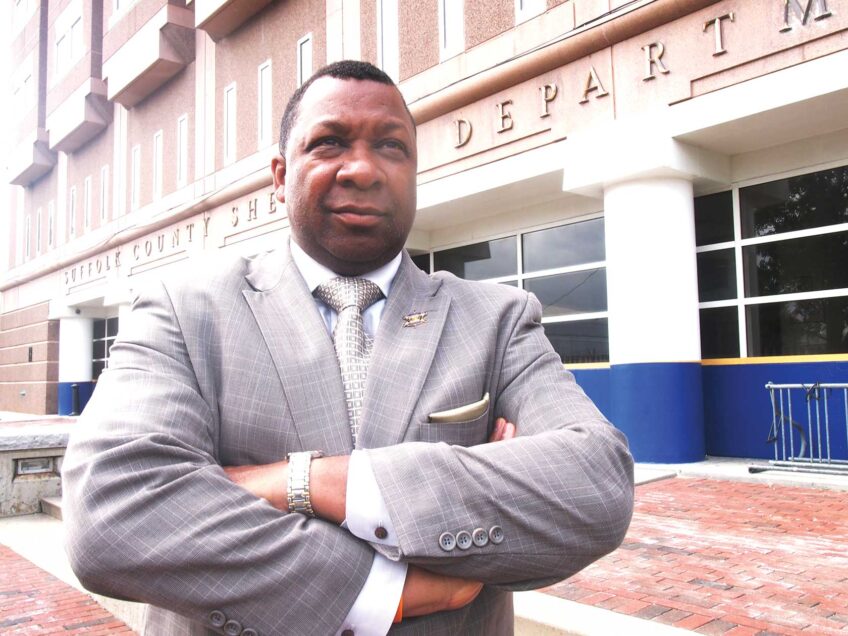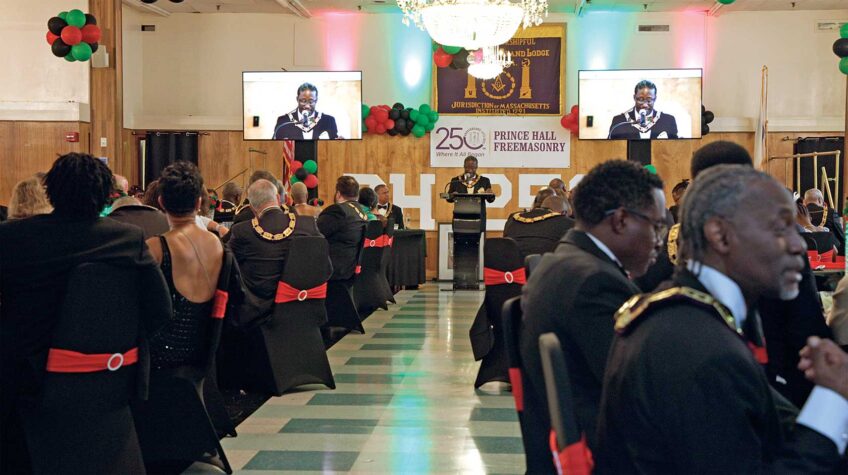Mayor-elect Wu appoints transition team members
Activists want to see people of color in major roles

Mayor-elect Michelle Wu rolled out her transition team Tuesday, one week before she is due to be sworn in.
Wu, who won last week’s mayoral election with 64% of the vote, will replace acting Mayor Kim Janey Nov. 16, when she takes the oath of office in the City Council chamber. She plans a more formal swearing-in at the beginning of her full term as mayor in January.
Wu has chosen as co-chairs of her transition team former state Rep. Charlotte Golar Richie, former Massachusetts secretary of Administration and Finance Jay Gonzalez and New England United 4 Justice Executive Director Noemi “Mimi” Ramos.
Janey will serve as honorary chair of the team, which includes an additional 13 members. (See a list of all the names at the end of this story.)
The members will assist Wu with advancing priorities during the transition period, according to a press release from her transition team. The team is also widely expected to help Wu fill key positions in her cabinet. Wu has launched a transition website, www.allaboardboston.com, where people interested in serving in her new administration can upload their resumes.
Wu said she expects the team to help the city’s communities connect to her administration as it forms.
“This group represents just the beginning of our work to uplift bold solutions to the biggest challenges that await us, and to enlist community in the work of making them a reality,” she said in a press statement. “Their expertise and lived experiences are a reflection of the possibility and promise of our city, and I’m honored to have their partnership engaging residents across the city in these early days.”
Activists of color are looking to Wu to assemble a cabinet that is reflective of the city’s diversity.
“We want to see Black, Latino and Asian directors of departments,” said Armani White, an organizer with the group Reclaim Roxbury. “People should feel welcome in City Hall in a way that they haven’t in the past.”
State Rep. Russell Holmes, who did not endorse in the mayoral race, said Black Bostonians should be looking for the Wu administration to appoint people of color in positions that have power over hiring and budgets.
“We don’t want roles that are figureheads,” he said.
Holmes said activists in communities of color should be looking for appointments in the police, fire, EMS and school departments – the city departments with the highest numbers of employees and, in the case of public safety workers, with the highest salaries.
Holmes said he would like to see the city end its reliance on the Civil Service exam for hiring, a decades-old practice that has often resulted in lack of representation for Blacks, Latinos and Asians in the police and fire departments. Both departments also give an absolute preference to military veterans in Civil Service ranking, and because in the Greater Boston area, fewer Black, Latino and Asian people have served in the military than whites, those communities have been underrepresented in the police and fire departments.
“Clearly, Civil Service is not producing the diversity we want,” he said.
The challenge of wider access to city jobs is not limited to public safety agencies. While Blacks constitute 29% of the city’s workforce and Latinos 14%, both groups are overrepresented at the low end of the pay scale, according to data listed on the city’s Diversity Dashboard. Among those making less than $20,000 a year in city government, Blacks make up 44% and Latinos, 19%.
Asians, who make up 9% of the city’s population, make up just 4.6% of the city’s workforce.
The 13 members of Wu’s transition team are:
• Julian Agyeman, professor of urban and environmental policy and planning and Fletcher professor of rhetoric and debate, Tufts University
• Dana Alas, organizing director, 1199 SEIU United Healthcare Workers East
• Shawn Brown, executive director, Becoming A Man, Boston
• Joe Byrne, executive secretary-treasurer, North Atlantic States Regional Council of Carpenters
• Ali Fong, chef and co-founder, Bon Me
• Trish Fontanilla, head of community, Simplr
• Rev. Dr. Arlene Hall, pastor, Deliverance Temple Worship Center
• José Massó, broadcaster and producer, ¡Con Salsa! on WBUR
• Marcus McNeil, student, Fenway High School
• Cassandra Pierre, assistant professor, Boston University School of Medicine, and medical director of public health programs, Boston Medical Center
• Micho Spring, chair of the Weber Shandwick Global Corporate Practice, president of Weber Shandwick New England, and board chair of the Greater Boston Chamber of Commerce
• Kannan Thiruvengadam, climate activist and director, Eastie Farm
• Mitchell Weiss, Richard L. Menschel professor of management practice at the Harvard Business School








